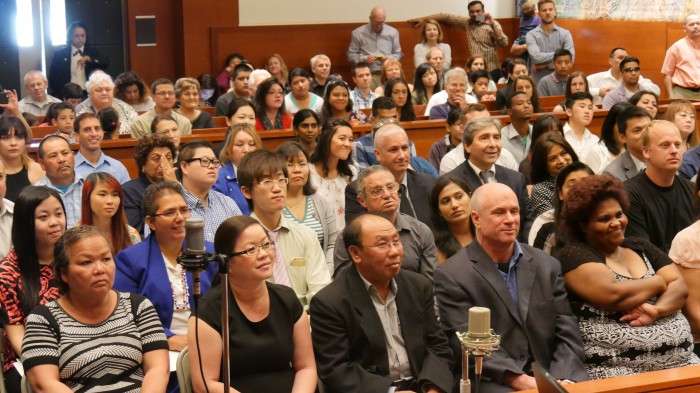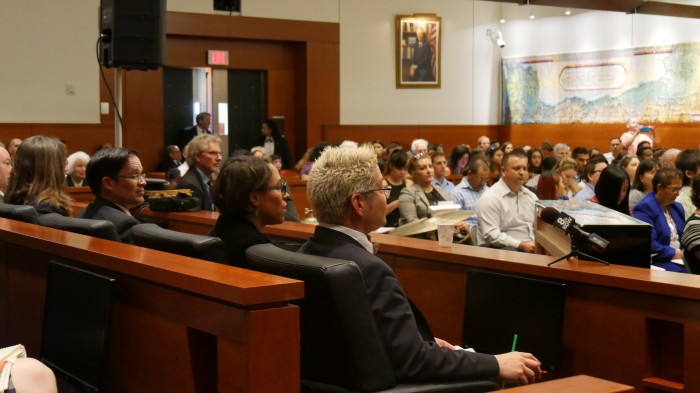Love of Country – Old and New
“And so, by fits and starts, by blood and toil and tears, we have come closer and closer to our highest aspirations, to our ideal, expressed at the very Founding, that all people are endowed by the Creator with certain rights that cannot be taken or given away, including life, liberty, and the pursuit of happiness.” – The Honorable Michael Mosman
Last Thursday June 18th we had the remarkable privilege of performing at a U.S. Naturalization Ceremony in downtown Portland, Oregon. Today the Supreme Court granted same-sex couples across the country the right to marry. It’s a wonderful day to be an American and to celebrate we wanted to share Presiding Judge Michael Mosman’s moving words from last week’s ceremony as he welcomed 71 new citizens from 37 different countries to their new home.
NATURALIZATION CEREMONY REMARKS
I. Welcome
It is a great privilege and honor for me to say a few words on this memorable day. If I had my way, we’d have a great feast, and we’d dance and sing together and celebrate. But, instead, you get a speech. I hope something I say might seem fitting for such a great occasion.
II. Emma Lazarus
It used to be, prior to air travel, that most immigrants to this country came by ship into New York harbor. As they sailed in they would pass the Statue of Liberty, a gift from France. There at the base of the statue was a poem by Emma Lazarus commemorating their arrival. As she put it, America was saying to the world, “Give me your poor, your tired, your huddled masses yearning to breathe free” … well, you get the idea. I appreciate her generous sentiment, but I think she got her description completely wrong. On days like today, we receive the bold, the brave, the adventurous; those who love freedom and have the courage to set out for a new land and make a new life. I admire you for what you have done.
III. Love of Country – Old and New
We are a better, more interesting country because of you. In food, in music, in art, in architecture, you bring us new ways of seeing the world. From some cultures we learn greater respect for elderly; from others, a greater love of children; from others new stories to explain life to each other. All of this is a great blessing to this country and to all of us.
You have many reasons to love the countries of your birth, and you will not be asked to forsake them. Perhaps what you love most about your homeland is its special geography; its mountains or deserts, a lake or river near where you called home. Or perhaps it is the particular people of your homeland: the unique culture of Thailand, or Botswana, or Ireland. For some, it might be your country’s long presence on the world stage; pride in what it means to have the ancient history of China, or Egypt, or Iran, or Greece as part of your heritage.
Many of these same things also apply to the United States. I hope you will come to experience, and treasure, its astonishing natural beauty; and come to love its people and their ways; and come to appreciate its history.
IV. An IDEA
But there is something else, unique to this country, for which we ask your allegiance and love. Unique in world history, we bind ourselves together not through geography, or genetics, or culture, or history, but through an idea.
Here is the idea: that regular, common, ordinary people can order their own lives and govern themselves. Abraham Lincoln called it government of the people, by the people, and for the people. And he really meant it, as we do.
A. The Vanguard Elite
It was, in its day, a very radical idea, viewed as crazy and dangerous by the established order of kings and czars and emperors and all those of high birth. They were sure that it was doomed to fail; that we would quickly degenerate into a mob, a rabble, and chaos, and beg to be rescued by some strong leader, some ubermensch. And these monarchs, always booted and saddled and ready to ride mankind to their own personal glory, waited, ready to rush in and take charge when the common people failed.
Thus it was. And thus they thought it ever would be. From Ghengis Khan to Adolph Hitler, from Alexander to Napoleon, the so-called great ones have always thought that the most wonderful thing the common people could do with their little lives was to serve the great leader and bask in his reflected glory.
To which the American colonists said, “No Thanks.” We’ll make our own country, and choose our own way, and live by our own laws, and govern ourselves. We’ll make a country where people can speak their mind freely, and worship as they please, and follow their own dreams.
And as for greatness and glory: well, we think there is something great about sitting down together as a family to share a meal in peace, or going to school to study what we choose, or starting a business. We may not win a name in history, but there is plenty of glory for us in living a good life.
V. The Torch is Passed
As I said, no one thought we could do it. They called it the American Experiment, and waited for it to fail.
There were tough times along the way; times when it looked like we might fail. We had to overcome the organic sin of slavery and the crimes of conquest against Native Americans. It took us far too long to recognize women as equal participants in this experiment. We had to figure out if we meant what we said when we said we believed in equal justice under law. It remains a work in progress. But we have come a very long way.
One of the things we used to tell immigrant families was that their children could grow up to be President of the United States. I thought I’d take a look at the current crop of presidential candidates. Depending on how you count, there are about ten or eleven candidates. They include the following:
1. Two women
2. One man whose parents both emigrated here from Cuba, and another whose father emigrated from Cuba.
3. Another man whose parents emigrated from Punjab, India.
4. A man whose father emigrated from Italy.
5. A man whose father emigrated from Poland, after losing most of his family to the Holocaust.
6. A man whose wife was born and raised in Mexico.
7. Two men whose grandparents, all of them, were immigrants, from Hungary, Italy, Ireland, Croatia, and Czechoslovakia.
8. An African-American man who became a prominent surgeon.
All of this follows the election—twice—of an African-American man whose father was from Kenya and who spend part of his childhood in Indonesia.
Perhaps I could make it a little more personal. Sitting to my left is my legal assistant, Elizabeth Kim Bingold. Her mother, Irene Schutzka, escaped from (what would become) East Germany as a young girl shortly before the construction of the Berlin Wall. She grew up in the Federal Republic of Germany, then won a Fulbright Scholarship to do graduate studies at Washington University in St. Louis. There she met Iloo Kim. Incredibly enough, he also had escaped a totalitarian regime. In 1950, as a boy, he fled North Korea on foot all the way to South Korea, where he grew up. White attending graduate school in the United States, he and Irene met, fell in love, married, became U.S. Citizens, and raised a lovely family in Southern California, including their daughter Elizabeth.
Elizabeth graduated with honors from U.C. Irvine, then made her way to Washington, D.C., where she worked for a Congressman from California. She eventually worked her way up to working for two different U.S. Senators, eventually becoming a special assistant to the Attorney General of the United States. In her spare time, she attended Georgetown Law Center, while also working in the Office of White House Counsel as a legal advisor to the President of the United States.
I wonder if Irene and Iloo, as they walked through the night to freedom, ever imagined they would have a daughter who would hold positions of such responsibility. I’m sure they are very proud. I tell you this story, however, not to embarrass Elizabeth, thought that is certainly fun to do. I tell it to you because her path is the same path that is available to all of your children. They may not choose government; they may choose to make beautiful music, or teach, or go into business. But they will be free to make that choice.
And so, by fits and starts, by blood and toil and tears, we have come closer and closer to our highest aspirations, to our ideal, expressed at the very Founding, that all people are endowed by the Creator with certain rights that cannot be taken or given away, including LIFE, LIBERTY, AND THE PURSUIT OF HAPPINESS.
And now it turns to you. When you take the Oath of Citizenship, what you are telling me is that you are ready to take your own place in this American Experiment. You are ready to show a doubting world that you can, by the honor and dignity of your life, prove worthy of self-government. You are telling me that you are ready to be the Master of your own life, the Captain of your own soul; that you love liberty, and that you can responsibly pursue happiness while respecting the free choices of others.
VI. CONCLUSION — You Can Do It
As I look around this room today, I have great confidence in you. With your help, Mr. Lincoln need not worry that government by the people will pass from the earth: it is here to stay.
And as you live out this idea in your future lives as citizens, your children and grandchildren will someday sing this song:
My Country, ‘tis of Thee [and they will call it that; “my country”]
Sweet Land of Liberty
Of thee I sing
Land where my fathers and mothers died
Land of the pilgrim’s pride
From every mountainside
Let Freedom Ring
Thank you, My Brothers and Sisters in this, the greatest Experiment in human history.
Thank you, as of today, my Fellow Americans.

